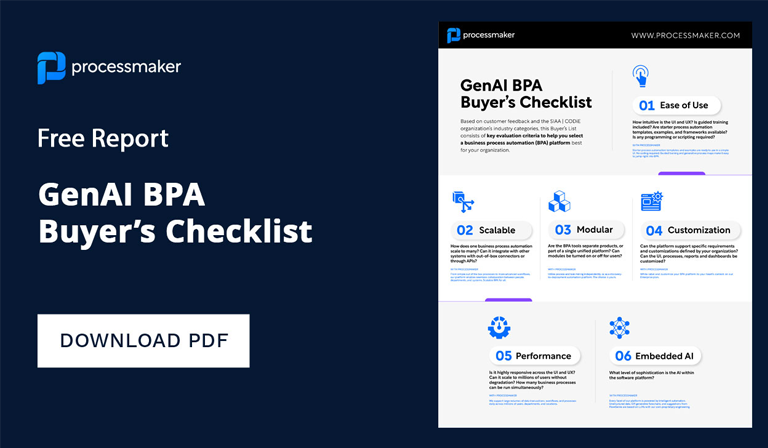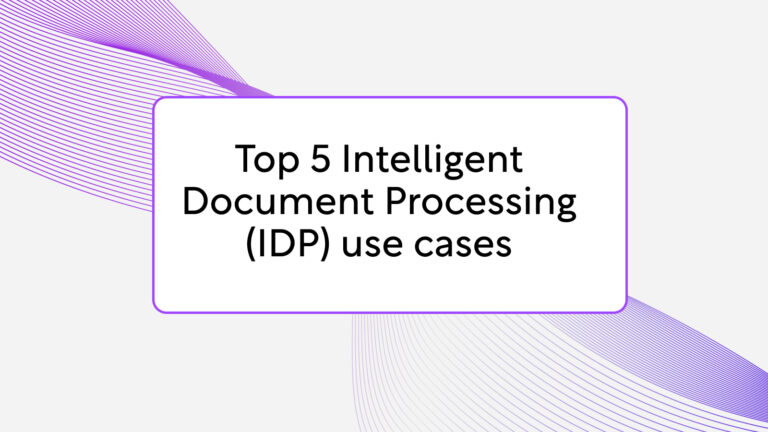Organizations create and store a lot of content but often know too little about what this content represents. To give meaning to content, much effort is needed in advance. However, classification of content is time-consuming and expensive when done manually. With the use of Artificial Intelligence (AI) and Machine Learning (ML) capabilities, this can be done exponentially faster and often more accurately. On top, the added value improves content discovery and analysis.
ProcessMaker IDP leverages AI and ML technologies for uncovering the true value of content. This article gives more insights into the unique cognitive capabilities of ProcessMaker IDP.
Post-OCR Correction
ProcessMaker IDP uses Optical Character Recognition (OCR) technology to extract text from documents. This makes documents searchable, and the extracted text can be used for further processing.
If the OCR service is not able to recognize words correctly, e.g., due to bad image quality or stains, they will be corrected with our Post-OCR Correction service. By using both a content-based correction model and a dictionary to correct the identified mistakes, we boost the quality of your OCR data.
Big Data Clustering
Machine Learning by itself is not the holy grail since it only works if a proper training set is available. Creating the training set involves substantial human effort when working with high volumes of many different types of documents.
ProcessMaker IDP uses clustering techniques to identify similar documents automatically. It helps to speed up the preparation of a training set and provide better and more accurate insight into the relations between documents.
Evolutionary Machine Learning
Proper Machine Learning requires both a training set and a test set, implementing classifiers, and finally testing the several classifiers based on the training data. To improve results, a data scientist must manually test classifiers and compare the results.
With ProcessMaker IDP Evolutionary Machine Learning, the system can dynamically determine the most optimal classifier to achieve the best results instead of using fixed classifiers with a fixed training set.
(Inter-)Active Learning
When the Machine Learner detects that the outcome is below a predefined threshold value, the business user will be notified. ProcessMaker IDP will request human intervention via an automatically generated task so that the pre-filled data fields can be corrected.
ProcessMaker IDP (Inter-) Active Learning feeds the human corrections back and lets the learning process use this for training and extension of the training set.
Named Entity Recognition
Most documents contain named entities. The named entity is a word or phrase that clearly identifies one item from a set of other items that have similar attributes. These can be either company names, dates, geographical locations or more specific items such as a serial or social security number. The detection of these entities further allows ProcessMaker IDP to discover Named Entity Relations to improve the performance and accuracy of information retrieval.
ProcessMaker IDP provides automatic Named Entity detection, and for specific needs the built-in annotation tool can be used to produce relevant training material.
Image Recognition
Powered by an Image Recognition algorithm, ProcessMaker IDP adds context to the images fully automatically. The algorithm uses Deep Learning techniques like Convolutional Neural Networks and is trained with a large set of images. As soon as it is trained, ProcessMaker IDP will understand what is on the image and enriches it with relevant tags describing the image’s contents.
Unlike most recognition tools, which use cloud-based services, ProcessMaker IDP’s image recognition technology runs on-premise. Therefore, it offers the ultimate privacy and data control.
Visual Configuration of Workflow
A typical Machine Learning task consists of several processors coupled together. ProcessMaker IDP provides extensive features that allow you to create such processes using a visual configuration interface. The visual configuration of the processors gives the user a detailed view of the steps within a task, and the flow of content through the entire configuration.
ProcessMaker IDP’s cognitive capabilities rely entirely on our own set of AI and Machine Learning technology. Our dedication to provide on-premise solutions ensures that the privacy and confidentiality of our client’s content is ensured. With maximum results.
ProcessMaker IDP offers multilingual tools to support our client operations both locally and internationally.





